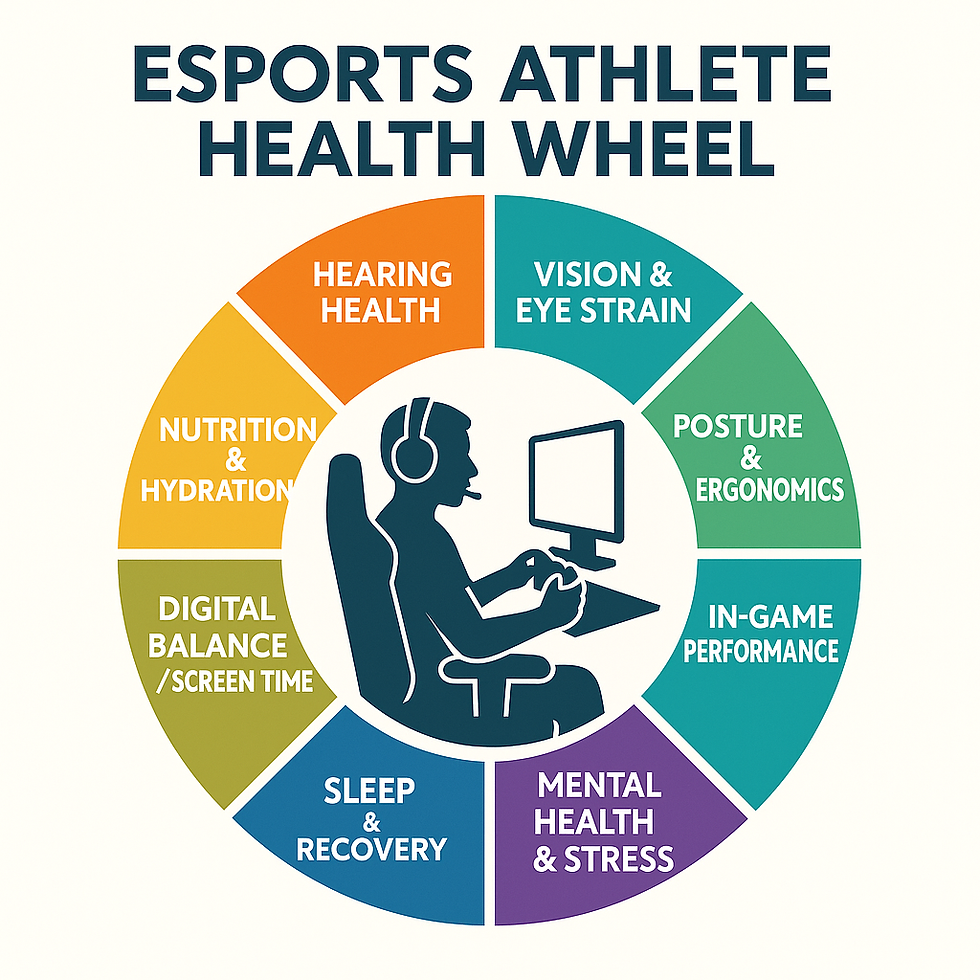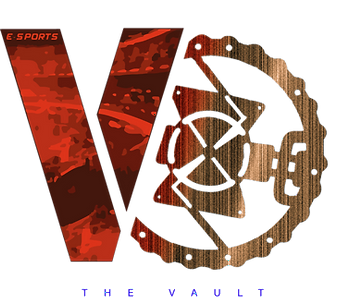Esports as a Real Athletic Path for Students Who Don’t Fit Traditional Sports
- Dr. Brian J

- Nov 18, 2025
- 7 min read
Updated: Nov 24, 2025
By Dr. Brian James, AuD, CCC-A
Clinical Audiologist , Founder of Esports Audiology & Co-Founder, The Vault Gaming Center - Portsmouth, Ohio

Esports can absolutely be a legitimate athletic path for students who don't fit traditional sports. Well-run school esports programs have been shown to support self-regulation, growth mindset, social-emotional development, and school engagement in ways very similar to traditional athletics-especially when teams are coached, intentional, and tied to academics.
At the same time, hundreds of colleges across North America now run varsity esports programs and collectively award millions of dollars in scholarships each year. That turns competitive gaming into a real pathway to higher education and careers, not just a pastime.
Not Every "Athlete" Looks Like a Varsity Football Player
When I talk with students and parents, I see the same pattern over and over:
A kid loves competition, strategy, and team dynamics.
But they're small, bigger-bodied, dealing with asthma or joint pain, or they're simply not into contact sports.
They get the message-subtle or not-that they're "not athletic."
Esports pushes back on that idea.
A student can be:
Physically limited but mentally sharp
Neurodivergent and uncomfortable in noisy locker rooms
More passionate about strategy, timing, and communication than sprint speed
...and still be every bit as competitive as any athlete on the field.
Organized school esports takes that competitive mindset and wraps it in structure:
Coaches and captains
Scheduled practices and scrims
Match reviews and "film study"
Team expectations and codes of conduct
From the outside, it starts to look a lot less like "kids playing games" and a lot more like varsity athletics in a different arena.
What the Research Actually Says
A growing body of research on scholastic esports is saying some important things:
Students in structured esports programs show improvements in self-regulation and growth mindset (learning to control emotions, bounce back from failure, and keep practicing after losses).
Esports teams often function as social-emotional learning labs-students practice communication, conflict resolution, and leadership under pressure.
When esports is school-based and adult-supervised, it can improve engagement, sense of belonging, and attendance, especially for students who feel disconnected from traditional school culture.
In plain language:
If you run esports like a sport, students develop the same "soft skills" we praise in athletics-just with a mouse and keyboard instead of cleats and pads.
Skill / Outcome | Traditional Sports | Esports | What It Looks Like in Esports |
Teamwork & communication | ✅ | ✅ | Shot-calling, role coordination, in-game communication |
Self-regulation & resilience | ✅ | ✅ | Handling tilt, staying calm, bouncing back after losses |
Strategic thinking & planning | ✅ | ✅ | Map control, rotations, drafts, resource management |
Time management & discipline | ✅ | ✅ | Balancing scrims, homework, tournaments, and rest |
Social-emotional development | ✅ | ✅ | Trust, empathy, handling criticism, supporting teammates |
Physical conditioning | ✅ (primary) | ⚪ | Helpful, but not the main barrier to participation |
Inclusion: Esports Expands Who Gets to Compete
Traditional sports can unintentionally send the message:
"If your body doesn't fit the mold, you don't belong here."
Esports changes the criteria.
Instead of “Are you fast enough?” the questions become:
Can you think ahead?
Can you communicate clearly under stress?
Can you stay calm and adapt when the game changes?
That opens doors for:
Students with physical disabilities who can compete from a seated position using adaptive devices.
Students with chronic health conditions who can’t safely endure high-impact sports.
Neurodivergent students who might struggle with chaotic locker rooms but thrive with clear roles and predictable routines.
Students who’ve been bullied or marginalized, who find a fresh start on a new kind of team.
Student Profile | Barrier in Traditional Sports | How Esports Creates Opportunity |
Physically small or larger-bodied | Cut from teams, limited play time | Skill and decision-making matter more than body type. |
Physical disability or chronic condition | Pain, fatigue, injury risk, limited access | Adaptive setups allow safe, meaningful competition. |
Neurodivergent (ADHD, autism, etc.) | Sensory overload, unstructured social dynamics | Clear roles, communication channels, structured play. |
Socially anxious or previously bullied | Fear of locker rooms / crowds / public performance | Controlled spaces, option for online comms, safe team. |
Tech-focused / STEM-oriented | Less interest in physical drills or contact | Direct bridge to IT, game dev, media, and analytics. |
For these students, esports is not a consolation prize.
It’s a primary athletic identity—the place where they finally get to be “the athlete.”
Academics: Does Esports Help or Hurt Schoolwork?
This is often the first real concern from parents and teachers:
"If my child joins an esports team, will their grades tank?"
The honest answer is: It depends on how the program is run.
When esports is structured like a sport:
Teams set minimum GPA requirements and attendance expectations.
Players know they can be benched for missing homework just like for missing practice.
Coaches schedule practices that end at reasonable times, protecting sleep and study time.
In that environment, students learn to manage their time:
Homework first, scrim later
Prepare for tests, then queue
Play hard, but within boundaries
Programs that do this well often see academic performance stay stable or even improve because students don't want to lose their spot on the roster.
On the flip side, when gaming is totally unstructured-solo queues until 2 a.m., no rules, no guidance-it can hurt grades, sleep, and mental health. That's not "esports" though. That's just unmanaged screen time.
Health & Wellness: Turning a Risk into a Teaching Moment
As an audiologist, I care deeply about what happens to bodies and brains over time.
Let’s be honest:
Sitting for long hours, staring at a screen, and blasting headset volume is not automatically healthy.
Sleep deprivation, poor posture, and zero exercise can cause real problems.
But again, structure is the key.
A healthy esports program can teach:
Safe listening habits (how loud is too loud, and why hearing loss is permanent)
Basic ergonomics (chair height, monitor position, wrist support)
Screen-time hygiene (breaks, blue light filters, device cut-off times)
Physical warm-ups and stretches before scrims and matches

You can visualize this as a circular graphic with segments:
Sleep
Physical activity
Nutrition
Hearing protection
Eye comfort
Mental health
Screen-time habits
The message is simple:
“You’re an athlete. Your body and brain are part of your gear. Take care of them.”
From High School Esports to College and Scholarships
This is usually where parents lean forward:
“Wait… there are scholarships for this?”
Yes.
Right now:
Hundreds of colleges and universities in North America operate varsity or club esports programs.
Many of them offer partial or full scholarships for players, much like traditional athletics.
Around those teams is a growing ecosystem of academic programs: esports management, game design, broadcasting, event production, sports psychology, data analytics, and more.
For a student who:
Loves games
Learns teamwork and leadership in a digital environment
Builds a highlight reel and an in-game track record
...esports can become a clear, concrete path to:
College recruitment
Financial aid
Internships
Tech and media careers
Stage | Esports Experience | College / Career Outcome |
Middle School | Casual clubs, local youth tournaments | Discover passion & basic skills |
High School | School team in a formal league, team leadership | Roster spot, highlight reels, leadership roles |
College | Varsity / club esports, related major or minor | Scholarships, professional connections |
Careers | Competitive play or support roles (IT, media, etc.) | Work in tech, gaming, streaming, events, audio |
Esports doesn’t guarantee a scholarship or job, of course—no sport does. But it puts students on a path where their effort and growth can be seen, measured, and valued.
Practical Steps for Parents, Schools, and Communities
For Parents
Ask about structure, not just screens.
Is your child part of a coached team, or just playing alone?
Set clear boundaries.
Homework and sleep come first. Esports should fit inside a healthy routine, not replace it.
Talk about roles and skills.
Ask your child what they do on the team: shot-caller, support, analyst, content creator. Then help them connect those skills to future careers.
Keep an eye on health.
Watch for signs of overuse: headaches, ringing ears, eye strain, mood changes. Those should trigger a quick course correction—not endless lectures, just adjustments.
Keep an eye on health.
Watch for signs of overuse: headaches, ringing ears, eye strain, mood changes. Those should trigger a quick course correction-not endless lectures, just adjustments.
For Schools and Districts
Recognize esports as a real program.
Give it official status—eligibility rules, codes of conduct, and administrative support.
Recruit broadly.Intentionally invite students who aren’t on other teams. You may be amazed who shows up when the barrier isn’t “Can you run a mile under 7 minutes?”
Connect esports to academics.
Use broadcasts for media and journalism classes.
Use stats and analytics in math and computer science.
Invite local professionals (IT, content creators, game devs) to speak.
Partner with local venues.Facilities like The Vault Gaming Center in Portsmouth, Ohio can host tournaments, bootcamps, or open houses where students experience esports in a professional environment.
Measure outcomes.Track attendance, GPA, behavior, and self-reported confidence for esports participants to build real data you can share with boards and funders.
FAQ
Q: Is esports really a sport, or just kids playing games?
Esports at the school level, when done right, looks very much like a sport: coaches, practices, game plans, teamwork, eligibility, and competition. The playing field is digital, but the skills-discipline, communication, resilience-are very real.
Q: Can esports help my child get into college?
Yes. Many colleges now offer scholarships and organized teams for esports. Strong grades plus a serious esports resume can absolutely help a student stand out.
Q: What about health and screen time?
Esports can be unhealthy if it's unstructured and unlimited. That's why it should be run like a sport, with set practice times, health guidelines, and adults who coach healthy habits-sleep, exercise, safe listening, and breaks.
Q: Is esports only for kids who want to go pro?
Not at all. Just like high school sports, only a small percentage will chase pro status. Many others will use esports to build confidence, friendships, leadership experience, and pathways into tech, media, and STEM fields.
About the Author
Dr. Brian James, AuD, CCC-A, is a licensed clinical audiologist and co-founder of The Vault Gaming Center in Portsmouth, Ohio. He specializes in hearing health and safe listening practices for gamers and esports athletes, helping students, parents, and schools build competitive, healthy, and sustainable gaming habits that support both performance and long-term wellness. esportsaudiology@gmail.com



